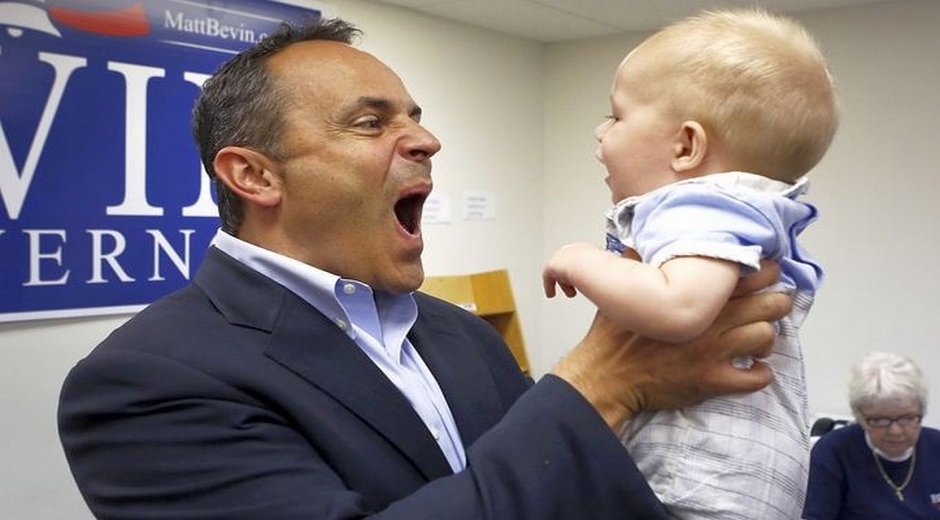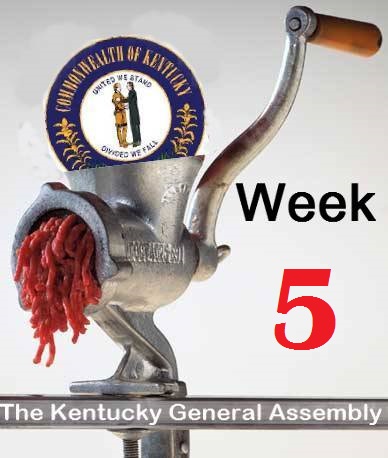
Governor Signs Informed Consent Law

Thomas McAdam
iLocalNews Louisville is your best source of news and information about Derby City.
- Professional Journalist
The first bill the 2016 General Assembly delivered to the governor would require a an in-person or real-time video conference between a woman seeking an abortion and a health care provider at least 24 hours before the procedure.
Kentucky’s pro-life governor, Matt Bevin, wasted no time signing the first pro-life law to pass the state legislature in 12 years. He signed the bipartisan state Senate Bill 4 into law Tuesday in an impromptu move after the state Senate approved it in a final vote Monday.
"This is an extraordinary day," Bevin said in signing his first bill into law since taking office.
Before doing so, the Republican governor asked the legislators whether they preferred he sign the bill right then or wait until next week when abortion opponents are scheduled to gather for a Capitol rally.
"We could do this ceremonially at that time or we could do it for real at that time," Bevin told the lawmakers. "You all tell me. Can it wait nine days? I'm going to defer to you."
Republican Sen. Julie Raque Adams, R-Louisville, deferred to Bevin, noting he's the governor.
Gov. Bevin decided to sign it on the spot.
The state Senate gave final passage of “informed consent” legislation, also known as Senate Bill 4, as amended by the House of Representatives by a 33-5 vote Monday. On Thursday, the House amended SB 4 to include the video conference option, known as “telehealth.” Backers of the House amendment said the telehealth provision would eliminate the burden of women having to make an extra trip to a clinic that provides abortions.
“This is a momentous occasion for this body,” said Senate Majority Floor Leader Damon Thayer, R-Georgetown, who noted that proponents have pushed for this legislation for 12 years. “Today we will give a voice to those who cannot speak for themselves.”
Sen. Julie Raque Adams said women seeking an abortion must already be told about the procedure and its risks, the probable age, child-support laws and agencies that assist women who opt to proceed with their pregnancy. Adams said what SB 4 does is “clarify” this information cannot be relayed just through a telephone conversation.
“I wanted to thank all the pro-life members of this chamber, and the ones over in the House, who have been steadfast in their determination to care, not only for the wellbeing and health of women, but for the unborn,” said Adams, who introduced the legislation.
Senate Minority Whip Julian Carroll, D-Frankfort, voted for the measure and thanked his colleagues who also supported SB 4.
“This clearly reflects the opinion of a number of us in my party … ,” Carroll said. “We are quite pleased this legislation has now passed both the House and Senate to protect the unborn in Kentucky.”
Sen. Reginald Thomas, D-Lexington, said he voted against SB 4 because it is unnecessary. He then cited studies that found the majority of women receiving abortions are college educated.
“It is obvious these women understand, given their age and education, what it means to be pregnant,” he said. “To require these women to have a conference … to explain the obvious is just ridiculous. I see no reason, no purpose, for this legislation.
Kentucky Senate moves to cut Planned Parenthood funds
On the same topic, the state Senate has passed legislation intended to curb the flow of non-Medicaid, state-administered tax dollars to Planned Parenthood clinics in Kentucky.
Dubbed the “Defunding Planned Parenthood Legislation,” Senate Bill 7 passed by a 33-5 vote on Tuesday. The bill now goes to the House of Representatives for consideration.
SB 7 would establish a three-tiered system for the state to fund family planning services, said bill sponsor Sen. Max Wise, R-Campbellsville. The first funding priority would be public health departments. The second funding priority would be nonpublic clinics that provide comprehensive primary and preventive health services. The third funding priority – if any money remains – would be to Planned Parenthood.
“Due to existing federal law and prior federal court of appeals decisions, this bill does not impact Medicaid funds that flow to Planned Parenthood,” Wise said. “While that is regrettable … it is the current landscape within which we must work.”
Wise said that Planned Parenthood-affiliated facilities performed more than one-third of all abortions in the United States. “Until more significant changes can be made at the federal level, we must do what we can to keep public funds from groups like Planned Parenthood which callously profit from death.”
Sen. Reginald Thomas, D-Lexington, voted against SB 7.
“Planned Parenthood serves a profound public purpose in this country and in this state,” said Thomas, who has a Planned Parenthood clinic in his district. “First of all Planned Parenthood serves women who ordinarily wouldn’t be able to … obtain the family planning services that we value as a society.”
He said the clinic in his district served 1,350 people in 2014, adding that 60 percent of those women were below the 100 percent poverty level. He added that Planned Parenthood also provides cancer screening for women – a service badly needed in a state that routinely leads the nation in cancer rates.
Prior to the floor debate and subsequent vote on SB 7, the Senate went into recess so some senators could walk another abortion-related bill to the governor’s office for his signature.
It was the “informed consent” bill, also known as Senate Bill 4, which passed out of the Senate on Monday. SB 4 would require an in-person or real-time video conference between a woman seeking an abortion and a health care provider at least 24 hours before the procedure.

Gideon John Tucker (February 10, 1826 – July 1899) was an American lawyer, newspaper editor and politician. In 1866, as Surrogate of New York, he wrote in a decision of a will case (Final Accounting in the Estate of A.B., 1 Tucker 248, N.Y. Surr. 1866): "No man's life, liberty or property are safe while the Legislature is in session."